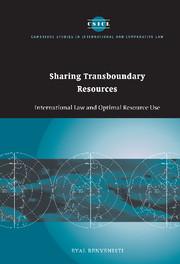Book contents
- Frontmatter
- Contents
- Acknowledgments
- Table of cases
- List of abbreviations
- 1 Introduction
- 2 The need for collective action in the management of transboundary resources
- 3 States as collective actors
- 4 The transnational conflict paradigm: structural failures and responses
- 5 Transnational institutions for transboundary ecosystem management: defining the tasks and the constraints
- 6 The structure and procedure of institutions for transboundary ecosystem management
- 7 The development of positive international law on transboundary ecosystems: a critical analysis
- 8 Efficiency, custom, and the evolution of international law on transboundary resources
- 9 Conclusion
- Bibliograhy
- Index
- CAMBRIDGE STUDIES IN INTERNATIONAL AND COMPARATIVE LAW
1 - Introduction
Published online by Cambridge University Press: 14 July 2009
- Frontmatter
- Contents
- Acknowledgments
- Table of cases
- List of abbreviations
- 1 Introduction
- 2 The need for collective action in the management of transboundary resources
- 3 States as collective actors
- 4 The transnational conflict paradigm: structural failures and responses
- 5 Transnational institutions for transboundary ecosystem management: defining the tasks and the constraints
- 6 The structure and procedure of institutions for transboundary ecosystem management
- 7 The development of positive international law on transboundary ecosystems: a critical analysis
- 8 Efficiency, custom, and the evolution of international law on transboundary resources
- 9 Conclusion
- Bibliograhy
- Index
- CAMBRIDGE STUDIES IN INTERNATIONAL AND COMPARATIVE LAW
Summary
Transboundary resources: delineating the challenges
For the thousands of Muslim worshippers who gathered in mosques across the Middle East one Friday morning, as the second millennium was drawing to an end, only God could end the misery caused by the worst drought experienced in their lifetimes. Thousands of Jewish worshippers joined them the following morning, fervently reciting the daily prayer for rain. Indeed, as these prayers suggested, the occurrence of drought was a matter beyond human control. Yet the praying, which the political leaders ceremoniously attended, furthered the wrong perception of water shortage as a problem of dwindling supplies. It deemphasized the governments' responsibility for the inability to manage responsibly the conflicting demands for water and to reduce waste. Indeed, much of the plight of the worshippers was a result of human conflict and government failure to correct inefficiencies in water management systems and to prevent environmental degradation.
Dating back three millennia, the Middle East has been a region where impressive instances of efficient small-scale demand-management systems have thrived. Villagers have managed to design and implement collective mechanisms for the shared management of small springs, aquifers, and floods. Thanks to these ancient systems, many of these villages survive to this very day. One would have hoped that the emergence of the modern state in the Middle East towards the end of the second millennium would have produced similar successful arrangements on a regional or even national scale.
- Type
- Chapter
- Information
- Sharing Transboundary ResourcesInternational Law and Optimal Resource Use, pp. 1 - 21Publisher: Cambridge University PressPrint publication year: 2002

